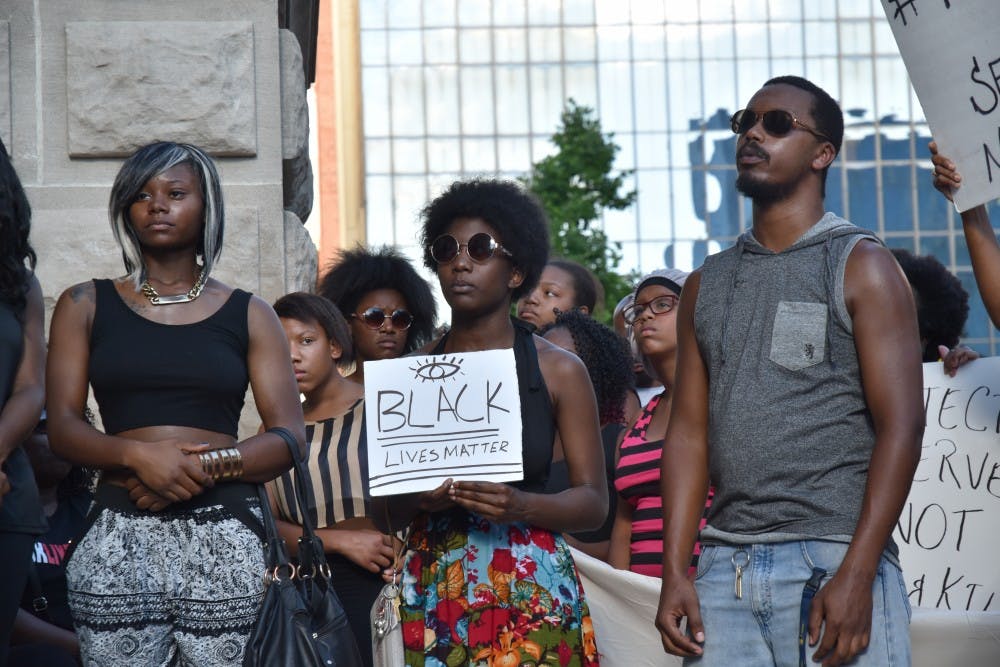After two shootings this past week in Louisiana and Minnesota by police officers, a Black Lives Matter protest throughout the downtown Indianapolis streets on Saturday led around 600 people to the Indiana State House.
Protesters called for justice and condemned police brutality.
Organizers on the steps of the state house spoke to the crowd of demonstrators about spreading awareness about the BLM movement, police-community relations and how white people can contribute to the movement.
Article continues after video.
Leah Humphrey, a member of the Black Lives Matter activist group Indy10 and resident of Indianapolis, was at the demonstration to honor the lives of the victims of officer-involved shootings and to inspire people to join the movement.
“We’re here to honor Alton Sterling. We’re here to honor Philando Castile. We’re here to start a revolution and spark a fire in someone else so they can continue the revolution,” Humphrey said.
Humphrey has been organizing and protesting for the BLM movement for two years, beginning just a week after Michael Brown was killed in Ferguson, Missouri.
She said she believes the problem of police brutality comes from racism and fear.
“It’s a culture of racism, a system of racism, a fear of black people," she said. "[It's a] marginalization of black people and poor people, and [police] don’t respect our lives."
The Indianapolis-based activist also addressed the debate between the phrases "black lives matter" and "all lives matter."
“All lives matter is not a thing. It’s like a myth. It’s something they say just to shut down the Black Lives Matter movement,” Humphrey said. “All lives have never mattered, or there would never have been slavery. We still wouldn’t be getting killed by police, or there wouldn’t be mass incarceration or homelessness.”
Ryan Walstrom, a junior political science and economics major at Ball State, joined the demonstration to support the BLM movement.
“I think it’s important not just to express support verbally but to try and be involved whenever you can,” Walstrom said.
He said he believes protests around the country are a response to racism in society and problems most people are not aware of.
“I think [the BLM movement] is trying to call attention to those issues and say that we need to address them, not just sweep them under the rug and pretend that we solved all of our problems already," he said.
Rayvon Williams, a senior Spanish and child life major and vice president of Ball State’s Black Student Association, said she attended the demonstration because she thinks protesting is the first step in pushing for change.
“I just feel like the Black Lives Matter movement is really important in these days, and this is the first step in making a change for justice and our people,” she said.
She said change isn’t possible without the help of other groups of people.
“I think we need to come together and unite," Williams said. "Just standing with African American people with Caucasians and Latinos [is important] because we can’t do it alone."
Supporting black businesses and communities is something she believes will also help enact change.
Malachi Carter, a resident of Indianapolis, said he stands with the BLM movement because of the current situation America is in.
“I talk to people on social media all the time about racism and the things America goes through," Carter said. "When we go through these crisis situations on both ends, like when we have black men who are being slaughtered and when we have people who take it upon themselves to take actions of justice, ... it turns out in really negative ways.”
When Carter was walking by police officers at the protest, he noticed some people were directing insults at the police, and he compared it with the hate that Micah Johnson, the gunman who recently killed five police officers in Dallas, might have had in his mind.
“Some people were chanting things purposely toward [the police], and that’s not the way to go,” Carter said. “Some people were flipping the bird at them, and that’s just as bad as the shooter in Dallas. That’s just hateful and that’s the same mindset.”
There were no arrests between protesters and police during the demonstrations throughout Indianapolis.





